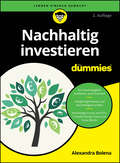- Table View
- List View
Nachhaltig investieren für Dummies (Für Dummies)
by Alexandra BolenaSo legen Sie Ihr Geld »gut« an! Für nachhaltigen Klima- und Umweltschutz muss sich auch das Finanzsystem ändern. Wie Sie in nachhaltige und zukunftstaugliche Projekte und Unternehmen investieren – und das auch noch gewinnbringend –, erfahren Sie in diesem Buch. Hier finden Sie Tipps zu Anleihen, Aktien, Fonds und ETFs sowie vielen anderen innovativen Möglichkeiten, Ihr Geld »gut« anzulegen: Lesen Sie alles über Green und Social Bonds, Investments in nachhaltige Sachwerte, Mikrofinanz- oder Crowdinvesting und warum eines dieser Themen sicher auch zu Ihren Vorstellungen passt. Sie erfahren Warum und wie der Megatrend Nachhaltigkeit Rendite verspricht Wie sich der Green Deal auf die Finanzindustrie auswirkt Wie Sie Greenwashing erkennen Was Finanz-Gütesiegel aussagen
Nachhaltig leistungsfähig bleiben: Praxis-Tipps für den Business-Marathon
by Claudia KraazDurch das Buch „Nachhaltig leistungsfähig bleiben“ erfahren Sie, wie Sie im Businessalltag stressresistent, resilient und gesund bleiben. Denn das von Stress, Druck und Veränderungen geprägte Geschäftsleben ist kein Sprint, sondern ein Marathon. Daher ist es wichtig, den eigenen Energiespeicher bewusst zu managen. Kompakt und praxisorientiert erfahren Sie im ersten Teil des Buches, welches die Bestandteile nachhaltiger Leistungsfähigkeit sind. Dabei liegt der Schwerpunkt auf der Umsetzung von Handlungsempfehlungen. Dazu erhalten Sie zahlreiche Übungen und Praxis-Tipps. Im zweiten Teil werden diese Empfehlungen gespiegelt durch die Einschätzungen von prominenten Führungspersönlichkeiten. Aus den Interviews mit drei CEOs, drei Personalchefs und drei Experten über deren Erfahrungen mit dem Thema erhalten Sie wertvolle Impulse zur Umsetzung. Zielgruppen: Das Buch ist leicht lesbar und richtet sich an alle Berufstätigen und Führungskräfte. Zur Autorin: Claudia Kraaz ist Führungs- und Stress-Coach sowie Resilienz-Trainerin. Zuvor war sie über ein Jahrzehnt in leitenden Positionen in der Unternehmenskommunikation tätig.
Nachhaltig verhandeln im Technischen Einkauf: So erzielen Sie Win-Win-Lösungen im Beschaffungsmanagement
by Guido WenskiDieses Buch gibt einen praktisch orientierten Überblick über die Verhandlungsführung im Rahmen des industriellen Beschaffungswesens. Es bildet sowohl für Neulinge als auch für erfahrene Einkäufer und Führungskräfte eine wertvolle Arbeitsgrundlage für die Beschaffung von Maschinen und Anlagen, Hilfstoffe und Dienstleistungen zu günstigen Konditionen.Der Blick ist auf nachhaltige Erfolge im Gegensatz zu kurzfristigen Ergebnissen gerichtet. Die wichtigsten Einflüsse auf den Verhandlungserfolg werden über die ERFOLGsformel erläutert. Das Akronym steht für die kritischen Faktoren, die für günstige Beschaffungsergebnisse relevant sind: E = Einkäufer, R = Regelbefolgung (Compliance), F = Führung, O = Organisation, L = Lieferant (bzw. Legal) und G = Geschäftsmodell. Der Einfluss dieser Faktoren wird anhand von Regeln, Tipps und konkreten Beispielen sowie an einem realitätsnahen Verhandlungsfall anschaulich aufgezeigt. Nicht nur strategische und operative Einkäufer sowie Leiter von Beschaffungsabteilungen, sondern auch Mitarbeiter in Disposition und Logistik sowie Bedarfsträger erhalten wertvolle Anregungen für die Beschaffung erklärungsbedürftiger Verhandlungsobjekte. Für Vertriebsingenieure und Account Manager dürften die Inhalte ebenfalls hilfreich sein.
Nachhaltig wirtschaften in der Praxis: Empfehlungen, Arbeitsschritte und Best-Practice-Lösungen für den Betriebsalltag
by Stefan TheßenvitzDieses Praxisbuch ermöglicht jedem Unternehmen, einen individuellen, machbaren Zugang zum nachhaltigen Wirtschaften zu finden. Das Konzept bezieht sich auf die individuelle Lebenswirklichkeit und Bedingungslage vor Ort und löst die Komplexität des Themas in fassbare Arbeitspakete mit konkreten Arbeitsschritten auf, unterstützt von Vorlagen und Arbeitsbögen. Theßenvitz entwirft ein prozessorientiertes, integratives Managementsystem, das alle Aspekte der nachhaltigen Unternehmensführung umfasst - Ökonomie, Ökologie und Soziales - unter Bezug auf international anerkannte Vereinbarungen, Ziele und Standards (SDG, GRI, DNK). Es ist unerheblich, nach welchen Standards sich ein Unternehmen zertifzieren lässt, nach EFQM, ISO, EMAS oder den Umweltpakten der Bundesländer. Mit dem Bezug auf die SDG, die GRI und den DNK kann jedes Unternehmen nachhaltiges Wirtschaften implementieren und zukunftsfähig werden.
Nachhaltige Einkaufsentscheidungen im B2B und B2C (Beiträge zur empirischen Marketing- und Vertriebsforschung)
by Alicia GerlachDieses Buch befasst sich mit nachhaltigen Einkaufsentscheidungen im B2B und B2C. Der Wunsch nachhaltige Kaufentscheidungen zu treffen, hat sowohl im organisationalen als auch privaten Umfeld eine hohe Priorität. Dabei liegt häufig die ökologische Nachhaltigkeit im Fokus, während die ökonomische Nachhaltigkeit weniger Beachtung findet. Dabei kann eine gemeinsame Betrachtung dabei helfen, Umweltziele mit finanziellen Einsparungen zu kombinieren, indem die Kosten über den gesamtem Produktlebenszyklus betrachtet werden.Durch zwei Forschungsprojekte wird in diesem Buch untersucht, was Entscheidungsträger im B2B und B2C daran hindert, ökonomisch nachhaltige Kaufentscheidungen zu treffen und wie sich diese Barrieren überwinden lassen. In der ersten Forschungsarbeit wird analysiert, wie sich die Entscheidungseinheit (Individuen vs. Gruppen) auf das Treffen ökonomisch nachhaltiger Kaufentscheidungen auswirkt und wie gezielte Trainings hinsichtlich Total Cost of Ownership als ökonomisch nachhaltiges Konstrukt diese Entscheidungen verbessern können. In der zweiten Forschungsarbeit widmet sich die Autorin der Auswirkung von Produktsignalen wie Einkaufspreisen oder Darstellungen von Energieinformationen (wie z.B. Energielabels) auf das Treffen ökonomisch nachhaltiger Kaufentscheidungen.
Nachhaltige Entwicklung: Der Weg in eine lebenswerte Zukunft
by Ulrich HolzbaurDie zentrale Frage des 21sten Jahrhunderts ist, wie wir zukünftigen Generationen ein lebenswertes Leben ermöglichen – das ist der Kern der Nachhaltigen Entwicklung. Im vorliegenden Buch beschreibt Ulrich Holzbaur die wichtigsten Aspekte dieses Themenkomplexes.Begriffsklärung, Entwicklung und Grundlagen des Konzepts der Nachhaltigen Entwicklung münden in eine Betrachtung der drei wesentlichen Bereiche Umwelt, Wirtschaft und Gesellschaft. Immer steht der Mensch im Zentrum der Überlegungen. Der Autor zeigt auf, was wir alle im privaten, ehrenamtlichen und beruflichen Bereich für die Zukunftsfähigkeit tun und wie wir die Gesellschaft der Zukunft vorbereiten können. Er erläutert die Bedeutung von Bildung, Modellen und Kommunikation für die Befähigung zu zukunftsorientiertem Handeln in einer komplexen Welt sowie zentrale Begriffe und Konzepte wie Ressourcen, Gerechtigkeit, Menschenrechte, Kultur und neue Wohlstandskonzepte.Holzbaur vermittelt notwendige Grundlagen und zeigt, wie wir nicht-nachhaltige Entwicklungen und Konflikte erkennen und im Sinne Nachhaltiger Entwicklung agieren können. Nicht zuletzt will der Autor damit den Lesern auch die Angst vor der Zukunft nehmen.
Nachhaltige Events agil umgesetzt: Erfahrungen und Best Practices (essentials)
by Sabine Böhling Colja DamsNachhaltigkeit ist das neue Profitabel und wird auch im Veranstaltungssektor zum Entscheidungsmerkmal werden. Doch wie muss ich mich als Agentur und Dienstleister wandeln, um nachhaltige Events sicherzustellen. Wir zeigen nicht nur einige Stellschrauben für nachhaltige Events auf, sondern setzen zuvor bei der eigenen Organisation an. Hier hat sich Agilität als Beschleuniger für nachhaltigen Wandel bewährt und wir sehen nachhaltige Organisationen als Basis für die Implementierung von nachhaltigen Events. Die Kombination aus Agilem und Nachhaltigem Eventmanagement ergibt eine zukunftsfähige Methode, Events strategisch, konzeptionell, kreativ und logistisch zu entwickeln und das Ganze nachhaltig. Als Basis für die Auswahl von Standards werden die ISO 20121und der ZNU-Standard vorgestellt.
Nachhaltige Events: Erfolgreiche Veranstaltungen durch gesellschaftliche Verantwortung (essentials)
by Ulrich HolzbaurIn diesem Leitfaden für nachhaltiges Eventmanagement bietet Ulrich Holzbaur einen kompakten Einstieg in die Entwicklung von nachhaltigen Events und ihre Erfolgsfaktoren. Dabei geht es sowohl um die nachhaltig positive Wirkung von Events als auch um die Umsetzung und Kommunikation von gesellschaftlicher Verantwortung im Event. Der Leitfaden führt in die Bereiche Eventmanagement und Nachhaltige Entwicklung ein und zeigt, wie nachhaltigkeitsorientierte Events und erlebnisorientierte Bildung für Nachhaltige Entwicklung umgesetzt werden. Die Integration von Eventmanagement und Nachhaltiger Entwicklung schafft ein Nachhaltiges Event, mit dem zukunftsorientierte Zielgruppen erfolgreich angesprochen werden.
Nachhaltige Events: Erfolgreiche Veranstaltungen durch gesellschaftliche Verantwortung (essentials)
by Ulrich HolzbaurIn diesem Leitfaden für nachhaltiges Eventmanagement bietet Ulrich Holzbaur einen kompakten Einstieg in die Konzeption und Umsetzung von erfolgreichen zukunftsorientierten Events und in ihre Erfolgsfaktoren. Dabei geht es sowohl um die nachhaltig positive Wirkung von Events als auch um die Umsetzung und Kommunikation von gesellschaftlicher Verantwortung im Event. Der Leitfaden zeigt, wie nachhaltigkeitsorientierte zukunftsbewusste Events strategisch geplant und operativ organisiert werden. Er zeigt auch, wie die Eventkonzepte als erlebnisorientierte Bildung für Nachhaltige Entwicklung umgesetzt werden. Durch die Integration von Eventmanagement und Nachhaltiger Entwicklung entsteht ein Nachhaltiges Event, mit dem zukunftsorientierte Zielgruppen erfolgreich angesprochen werden.
Nachhaltige Finanzen: Durch aktives Aktionärstum und Engagement Wandel bewirken
by CRIC – Verein zur Förderung von Ethik und Nachhaltigkeit bei der Geldanlage Claudia Döpfner Klaus Gabriel Rolf Ostmann Kevin Schaefers Sebastian Utz Gesa VögeleDialoge mit Unternehmen, die Ausübung der Stimmrechte oder das Einbringen von Resolutionen auf Aktionärsversammlungen sind Möglichkeiten für Investoren, Fortschritte im Sinne von Nachhaltigkeit anzustoßen, zu unterstützen oder sogar zu bewirken. Engagement lautet der Oberbegriff für diese verschiedenen Instrumente, die vielfach eingesetzt wurden und werden, mit Blick auf die ökologischen und sozialen Herausforderungen unserer Zeit jedoch noch viel ungenutztes Potenzial bergen. Das vorliegende Buch nähert sich dem Thema aus unterschiedlichen Blickwinkeln: Zunächst wird Engagement aus wissenschaftlichen Perspektiven heraus beleuchtet, um dann die Anlagestrategie historisch wie auch konzeptionell und strategisch zu betrachten. Spezialisierte Organisationen kommen mit ihren Zugängen und Aktivitäten zu Wort und Praxisbeispiele aus Bereichen wie Existenzlohn und Klimawandel werden angeführt. Perspektivische Überlegungen zu Wandel, Wirkung und gelingenden Dialogen schließen den Sammelband ab.
Nachhaltige Führung: Lektionen über Visionen, Mut und Hartnäckigkeit von CEOs, die es gewagt haben, eine bessere Welt zu schaffen
by Clarke MurphyDer Wall-Street-Journal-Bestseller nun auch in deutscher Sprache! Erzielen Sie mit Ihrem Unternehmen außergewöhnliche Ergebnisse im Bereich Nachhaltigkeit! In seinem Buch liefert der erfahrene Leadership-Experte Clarke Murphy ein Toolkit, mit dem Sie bemerkenswerte Ergebnisse im Bereich Nachhaltigkeit erzielen können. Sie erfahren, was es braucht, um ein "Sustainable Leader" zu werden, und wie Sie Ihre Nachhaltigkeitsversprechen in greifbare Taten umsetzen können. Anhand von Beispielen aus aller Welt beweist Murphy, dass Nachhaltigkeitserfolge für jede Führungskraft erreichbar sind. Er räumt mit dem Mythos auf, dass Nachhaltigkeit im Widerspruch zur Rentabilität steht, und verrät, wie Sie Nachhaltigkeit (Sustainability) zu Ihrer neuen Wachstumsstrategie machen können. Sie erhalten: - ein Schritt-für-Schritt-Rahmenwerk, wie Sie gute nachhaltige Führung entwickeln können; - pragmatische Beispiele für das Ausbalancieren der Anforderungen von Aktionären und anderen Stakeholdern; - Lektionen von CEOs darüber, wie sie angesichts von Rückschlägen den Kurs beibehalten haben; - Strategien, die Ihnen helfen, Ihre kurz- und langfristigen Nachhaltigkeitsziele zu erreichen. Das Buch ist ein unverzichtbarer und zeitgemäßer Leitfaden für mutige Führungspersönlichkeiten, die etwas bewirken und dazu beitragen wollen, eine bessere, widerstandsfähigere Zukunft zu schaffen - und gleichzeitig Unternehmenswachstum zu erzielen.
Nachhaltige Gesundheitsversorgung in Entwicklungsländern und Global Health Governance: Eine Einführung (SDG - Forschung, Konzepte, Lösungsansätze zur Nachhaltigkeit)
by Wolfgang HeinDieses Lehrbuch analysiert die Gesundheitssituation und Gesundheitsversorgung in Industrie- und Entwicklungsländern, wobei diese Dichotomie kritisch hinterfragt wird. „Gesundheit“ wird im Kontext der Auseinandersetzung über nachhaltige Entwicklung diskutiert. Dabei stehen Ziel 3 der Nachhaltigkeitsziele der Vereinten Nationen und Gesundheitsaspekte anderer Nachhaltigkeitsziele im Fokus. Es wird ein Überblick gegeben über unterschiedliche Niveaus der Gesundheitsversorgung in verschiedenen Gruppen von Ländern des globalen Südens, vertieft durch eine detaillierte Analyse der Gesundheitssysteme in Costa Rica, Indien und der Demokratischen Republik Kongo. Der zweite Teil analysiert die Rolle der internationalen Gesundheitspolitik in diesem Zusammenhang (bilaterale und multilaterale Kooperation, Global Health Governance als komplexes Regime). Das Buch schließt mit zusammenfassenden Überlegungen zu den Perspektiven der Gesundheitsversorgung in Entwicklungsländern, wobei die Diskrepanzen zwischen dem breit akzeptierten Ziel der Garantie einer universellen Gesundheitsversorgung (Universal Health Coverage) bis 2030 und den real geringen Verbesserungen in den ärmsten Ländern herausgearbeitet werden.
Nachhaltige Immobilien-Projektentwicklung: Schnelleinstieg für Architekten und Bauingenieure (essentials)
by Stefanie FriedrichsenDieses Essential beleuchtet die zentralen Aspekte und Abläufe bei der Entwicklung nachhaltiger Immobilien. Von der Zustandsanalyse über die Projektidee bis hin zur Wirtschaftlichkeitsanalyse werden wichtige Schritte und Konzepte erläutert, um eine langlebige, ökologische und sozialverträgliche Immobilie zu gestalten, die zugleich wirtschaftlichen Erfolg verspricht.
Nachhaltige Innovationen in klein- und mittelständischen Unternehmen (essentials)
by Wanja Wellbrock Daniela Ludin Erika Müller Melina BleibinhausKleine und mittlere Unternehmen (KMU) stehen vor neuen und großen Herausforderungen im Zusammenhang mit der laufenden Nachhaltigkeitstransformation. Obwohl sie als Innovationstreiber bekannt sind, verfügen sie oftmals nicht über die gleichen Kapazitäten wie große Unternehmen, um sich erfolgreich an Nachhaltigkeitsanforderungen anzupassen oder diese umzusetzen. Ausgehend von den theoretischen Perspektiven der Nachhaltigkeit und des Innovationsmanagements beschreibt das essential anhand einer empirischen Studie die Relevanz und den Umsetzungsstand von Nachhaltigkeit in Bezug auf die Innovationsaktivitäten deutscher KMU.
Nachhaltige Karriere – mit dem richtigen Job die Welt verändern: Anregungen für den Ein- und Umstieg in die Nachhaltigkeit
by Saskia Juretzek Sandra BroschatDieses Buch ist die passende Lektüre für alle, die sich auch im Beruf mit Themen wie umweltfreundliche Produktion, CO2-Reduktion und soziale Verantwortung in der Lieferkette beschäftigen möchten. Das Buch stellt verschiedene Karrierewege vor – in Unternehmen, Beratung, NGO, einer Stiftung, der Politik bis hin zur Wissenschaft. Vierundzwanzig erfahrene ExpertInnen geben in Interviews Einblicke in ihren Arbeitsalltag und zeigen, wie vielfältig eine Karriere in der Nachhaltigkeit sein kann. Das Buch beantwortet außerdem die Fragen: Welche Berufsbilder gibt es? Wie kann ich mich aus- und weiterbilden? Wie und wo gelingt der richtige Berufseinstieg und -umstieg und welche Kompetenzen braucht es dafür? Der InhaltDie Rolle von NachhaltigkeitsmanagerInnen im WandelStudiengänge und WeiterbildungenKarrierewege in der WissenschaftKarrierewege und Rollenprofile in der Wirtschaft, Politik und StiftungKompetenzen für eine Karriere in der Nachhaltigkeit Praktische Tipps für den Ein- und Umstieg InterviewpartnerInnen Prof. Dr. Dr. h.c. Stefan Schaltegger, Gründer und Leiter des Centre for Sustainability Management (CSM), Leuphana Universität Lüneburg Prof. Dr. Katharina Spraul, Professorin für Nachhaltigkeitsmanagement an der Technischen Universität Kaiserslautern Prof. Dr. Laura Marie Edinger-Schons, Professorin für Nachhaltiges Wirtschaften an der Universität Mannheim Prof. Dr. Tobias Hahn, Professor für Nachhaltigkeit an der ESADE Business School, Barcelona Ulrike Sapiro, Chief Sustainability Officer, Henkel AG & Co. KGaA Claudia von Bothmer, Head of Corporate Responsibility, Telefónica Deutschland Holding AG Dayane Kemmer Marquart, Nachhaltigkeitsbeauftragte, Signal Iduna Gruppe Markus Herz, Umweltmanager, Allianz SE Romy Feldmann, Sustainable Supply Chain Manager Operations, C&A Mode GmbH & Co. KG Simone Weuthen, Senior Manager Sustainability Communication, Fresenius Medical Care AG & Co. KG Sandra Coy, Sprecherin Unternehmensverantwortung und Qualität, Tchibo GmbH Claudia Görres, Referentin Corporate Citizenship, Audi AG Christiane Stöhr, Partnerin und Geschäftsleiterin, Scholz & Friends Reputation / Scholz & Friends Berlin GmbH Annette Daschner, Senior Manager Sustainability Services, PricewaterhouseCoopers GmbH Iris Braun, Chief International Officer, share GmbH Katharina Beck, Mitglied des Bundestages, BÜNDNIS 90 / DIE GRÜNEN HAMBURG Julia Scheerer, Project Manager Sustainable Economics, Bertelsmann Stiftung Janine Steeger, Moderatorin, Speakerin, Autorin, Co-Founderin Futurewoman.de Julia Selle, Niederlassungsleiterin Büro Düsseldorf, SOS Kinderdörfer weltweit Prof. Dr. Holger Hoppe, Professor für Nachhaltigkeits- und Umweltmanagement an der Technischen Hochschule Ingolstadt Katrin Huth, Sustainability Consultant, ClimatePartner GmbH Julia Drefahl, Referentin Nachhaltigkeitsmanagement und Kommunikation, Sparda-Bank München eG Dominique Breuer, Projektkoordinator Schmidt trifft Schmidtchen, Verein zur Förderung der sozialen Kreativität e.V. Rebecca Röcher, Head of Sustainability, Mast-Jägermeister SE
Nachhaltige Karriere – mit dem richtigen Job die Welt verändern: Anregungen für den Ein- und Umstieg in die Nachhaltigkeit
by Saskia Juretzek Sandra BroschatKarriere in der Nachhaltigkeit – was heißt das eigentlich genau, und welche Jobs gibt es in diesem Bereich? Dieses Buch ist das richtige für alle, die eine Karriere im Nachhaltigkeitsbereich einschlagen wollen – ob im Thema sozialer Verantwortung in der Lieferkette, der CO2-Reduktion von Unternehmensaktivitäten oder in der Nachhaltigkeitsberichterstattung und -Kommunikation. Es stellt neben möglichen inhaltlichen Schwerpunkten auch verschiedene Karrierewege vor – von Unternehmen und Beratungen bis hin zu NGOs, Stiftungen, Politik und Wissenschaft. In Interviews geben 24 erfahrene ExpertInnen einen Einblick in ihren Alltag und zeigen, wie vielfältig und aufregend eine Karriere im Bereich Nachhaltigkeit sein kann. Dabei wird auch auf wichtige Fragen eingegangen: Welche Berufe gibt es? Wie kann ich mich aus- und weiterbilden? Wie finde ich den perfekten Einstieg oder Umstieg in den Job und welche Skills sind dafür notwendig? Die zweite Auflage des Buches wurde aktualisiert: Studiengänge und Weiterbildungsmöglichkeiten wurden erweitert, die Berufsbilder überarbeitet und an wichtige regulatorische Änderungen durch bspw. die CSRD, das LkSG, die CSDDD und die Green Claims Directive angepasst.
Nachhaltige Konzepte im stationären Handel: Eine Analyse des Ladenbaus (BestMasters)
by Lena StrokaEine unaufhaltsame Bewegung hin zu Nachhaltigkeit kann in den verschiedensten Branchen beobachtet werden. Auch im Bereich des Lebensmitteleinzelhandels (LEH) fordern Kund*innen und staatliche Behörden nachhaltige Maßnahmen ein. Der Wissensstand und die Praxis beziehen sich hierbei in erster Linie auf das Produktsortiment und die Lieferketten des LEHs. Dem Ladenbau, also speziell dem physischen Umfeld des Ladens, wird hingegen wenig Beachtung in diesem Kontext geschenkt. Das vorliegende Buch untersucht, mithilfe welcher Maßnahmen der Ladenbau im Einzelhandel umfassend nachhaltig gestaltet werden kann. Es hinterfragt zudem, welchen Stellenwert die Kommunikation des nachhaltigen Ladenbaus bei Kund*innen einnimmt, um potenzielle Motivationsfaktoren für Einzelhändler*innen und Ladenbauer*innen ableiten zu können.
Nachhaltige Logistik
by Wolf-Rüdiger Bretzke Karim BarkawiDie Reduzierung von Schadstoffemissionen, Ölpreissteigerungen und eine überlastete Verkehrsinfrastruktur haben die Rahmenbedingungen der Logistik in den letzten Jahren völlig verändert. Die aktualisierte Neuauflage des Werks greift die Änderungen in der Umweltpolitik auf, die den Kontext unternehmerischer Entscheidungen bestimmen. Anpassungsstrategien werden vorgestellt und Themen wie Kreislaufwirtschaft, Prozess- und Netzwerkredesign, Citylogistik und Globalisierung anhand einer deutlich erhöhten Anzahl von Graphiken und Praxisbeispielen erörtert.
Nachhaltige MITO-Businessmodell-Transformation: Systematische Umsetzung mit dem MITO-Methoden-Tool
by Hartmut F. BinnerEntscheidungen in Unternehmen haben Auswirkungen auf die Gesellschaft und die Umwelt. Unternehmen müssen solche Auswirkungen ernst nehmen und Nachhaltigkeitsthemen in der Organisation und den Geschäftstätigkeiten berücksichtigen sowie geeignete Maßnahmen treffen (Corporate Social Responsibility – CSR). Entsprechend geht dies mit Transformationen einher, die vielfältige Herausforderungen hinsichtlich Bewertung und Entscheidungsfindung mit sich bringen. Dieses Buch beschreibt einen ganzheitlichen Ansatz zur Businessmodell-Nachhaltigkeitsgestaltung mit dem Ziel einer Integration aller Nachhaltigkeitsthemen. Eingesetzt wird das MITO-Methoden-Tool, das sich streng an den Vorgaben der DIN ISO 26000, den dort genannten Kernthemen der Nachhaltigkeit, den Handlungsempfehlungen und auch weiterführenden Nachhaltigkeitsregelwerken orientiert.
Nachhaltige Marktwirtschaft: Die Soziale Marktwirtschaft des 21. Jahrhunderts (essentials)
by Wolfgang ViewegWolfgang Vieweg zeigt kompakt und allgemein verständlich, inwiefern die Soziale Marktwirtschaft für die heutige Zeit zu eng geworden ist und weshalb sie unbedingt einer Erweiterung bedarf. In Sachen Nachhaltigkeit hat Deutschland inzwischen eine umfängliche und leistungsfähige Infrastruktur aufgebaut. Nachhaltigkeit ist Chefsache in der Politik, hat einen hohen Stellenwert in den Unternehmen und Menschen ändern ihr Konsumverhalten. Der Autor zeigt, wie die aktuelle Weiterentwicklung von Konzepten und Begrifflichkeiten schließlich in ein neues Bewusstsein mündet und somit die globale Transformation zu einer nachhaltigen Welt befördert.
Nachhaltige Marktwirtschaft: Die Soziale Marktwirtschaft des 21. Jahrhunderts (essentials)
by Wolfgang ViewegWolfgang Vieweg zeigt kompakt und allgemein verständlich, inwiefern die Soziale Marktwirtschaft für die heutige Zeit zu eng geworden ist und weshalb sie unbedingt einer Erweiterung bedarf. In Sachen Nachhaltigkeit hat Deutschland inzwischen eine umfängliche und leistungsfähige Infrastruktur aufgebaut. Nachhaltigkeit ist Chefsache in der Politik, hat einen hohen Stellenwert in den Unternehmen und Menschen ändern ihr Konsumverhalten. Der Autor zeigt, wie die aktuelle Weiterentwicklung von Konzepten und Begrifflichkeiten schließlich in ein neues Bewusstsein mündet und somit die globale Transformation zu einer nachhaltigen Welt befördert.
Nachhaltige Marktwirtschaft: Eine Erweiterung Der Sozialen Marktwirtschaft
by Wolfgang ViewegIn diesem Buch wird die Notwendigkeit einer programmatischen und terminologischen Weiterentwicklung der Sozialen zu einer Nachhaltigen Marktwirtschaft aufgezeigt. Es legt informativ dar, wie der aktuelle Stand bei der fortschreitenden Implementierung und Etablierung ist und welche Probleme entstehen können, wenn der Begriff „Nachhaltigkeit“ unterschiedlich interpretiert wird. Auch die Vorteile, die eine Nachhaltige Marktwirtschaft langfristig mit sich bringt, rücken ins Blickfeld. Dabei betrachtet der Autor zunächst Deutschland, aber notwendigerweise auch die globale Ebene: Umwelt- und Klimaschutz sind kein ausschließlich nationales Thema.Das deutsche Wirtschafts- und Gesellschaftsmodell der Sozialen Marktwirtschaft hat sich in den vergangenen 70 Jahren bestens bewährt. Die Grundidee bleibt auch immer noch richtig – aber wegen der globalen Transformation zu einer nachhaltigen Welt ist die Soziale Marktwirtschaft im Laufe der Jahrzehnte zu eng geworden und bedarf nun unbedingt einer Erweiterung.Die 2. Auflage wurde aktualisiert und an einigen Stellen präzisiert.
Nachhaltige Marktwirtschaft: Eine Erweiterung der Sozialen Marktwirtschaft
by Wolfgang ViewegIn diesem Buch wird die Notwendigkeit einer programmatischen und terminologischen Weiterentwicklung der Sozialen zu einer Nachhaltigen Marktwirtschaft aufgezeigt. Es legt informativ dar, wie der aktuelle Stand bei der fortschreitenden Implementierung und Etablierung ist und welche Probleme entstehen können, wenn der Begriff „Nachhaltigkeit“ unterschiedlich interpretiert wird. Auch die Vorteile, die eine Nachhaltige Marktwirtschaft langfristig mit sich bringt, rücken ins Blickfeld. Dabei betrachtet der Autor zunächst Deutschland, aber notwendigerweise auch die globale Ebene: Umwelt- und Klimaschutz sind kein ausschließlich nationales Thema. Das deutsche Wirtschafts- und Gesellschaftsmodell der Sozialen Marktwirtschaft hat sich in den vergangenen 60 Jahren bestens bewährt – aber im Laufe der Jahrzehnte ist sie allmählich zu eng geworden und braucht nun unbedingt eine Erweiterung.
Nachhaltige Personal- und Organisationsentwicklung (essentials)
by Katrin KellerDieses Buch beschäftigt sich mit wertschätzenden und verantwortungsbewussten Unternehmensstrategien der Zukunft, die sich an den Mitarbeitenden orientiert. Mit einer solchen Haltung kann es gelingen, ein langfristig attraktives Unternehmenssystem für Mitarbeitende aller Generationen zu schaffen. Das Buch soll ermuntern, irritieren und kreative individuelle sowie organisationale Möglichkeiten in sich verändernden berufsbiografischen sowie unternehmerischen Prozessen aufzeigen.
Nachhaltige Personalentwicklung und Weiterbildung: Betriebliche Seminare und Trainings entwickeln, Erfolge messen, Transfer sichern
by Simone KauffeldDieser Praxisleitfaden hilft, Maßnahmen der Personal- und Kompetenzentwicklung sowie der beruflichen Weiterbildung bedarfsgerecht, effizient und nachhaltig zu entwickeln und durchzuführen. So sichern Sie den Erfolg von Trainings, Seminaren und Workshops langfristig! – Neben Anleitungen zur Entwicklung und Durchführung von Seminaren (Bedarfsanalyse, konkrete Tipps aus den wichtigsten Lerntheorien und der Personalpsychologie, Trainingsformen) vermittelt dieses Buch Instrumente zur Trainingsevaluation und Transfer-Sicherung auf verschiedenen Ebenen (Teilnehmer, Training, Arbeitsumgebung), außerdem wird die Rolle der Führungskräfte für den Lerntransfer beleuchtet. Es kommt praxisnah auf den Punkt und enthält Checklisten, Fallbeispiele, Tipps zur Software-Unterstützung (Learning-Management-Systeme) sowie Arbeitsmaterialien zum Download. Ein Buch für Trainer, Trainingsentwickler, Seminaranbieter, Weiterbildungseinrichtungen, Personalentwickler und Personalleiter.
























